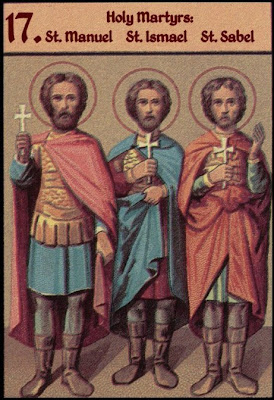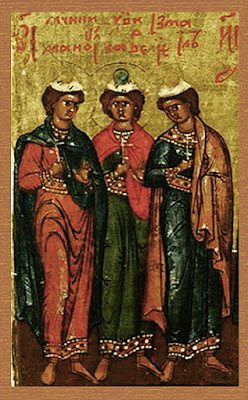Holy Martyrs Manuel, Sabel and Ishmael (Feast Day - June 17)
Verses
Sabel, Manuel and Ishmael were Persians by race,
By office however they were Martyrs by the sword.
On the seventeenth the three brothers were beheaded by the sword.
Verses
Sabel, Manuel and Ishmael were Persians by race,
By office however they were Martyrs by the sword.
On the seventeenth the three brothers were beheaded by the sword.
The Holy Martyrs Manuel, Sabel and Ishmael, brothers by birth, were descended from an illustrious Persian family. Their father was a pagan, but their mother was a Christian, who baptized the children and raised them with firm faith in Christ the Savior.
When they reached adulthood, the brothers entered military service. Speaking on behalf of the Persian emperor Alamundar, they were his emissaries in concluding a peace treaty with the emperor Julian the Apostate (361-363). Julian received them with due honor and showed them his favor. But when the brothers refused to take part in a pagan sacrifice, Julian became angry. He annulled the treaty and incarcerated the ambassadors of a foreign country like common criminals.
At the interrogation he told them that if they scorned the gods he worshipped, it would be impossible to reach any peace or accord between the two sides. The holy brothers answered that they were sent as emissaries of their emperor on matters of state, and not to argue about "gods." Seeing their firmness of faith, the emperor ordered the brothers to be tortured.
They beat the holy martyrs, then nailed their hands and feet to trees. Later, they drove iron spikes into their heads, and wedged sharp splinters under their fingernails and toenails. During the entire time of torturing they prayed to God with thanksgiving for their tortures: "O sweet Jesus these torments are sweet for the sake of Your love!" An angel of God appeared to them, comforted them and removed every pain from them.
Finally, the holy martyrs were beheaded. Julian ordered their bodies to be burned, and suddenly there was an earthquake. The ground opened up and the bodies of the holy martyrs disappeared into the abyss. After two days of fervent prayer by the Christians, the earth returned the bodies of the holy brothers, from which a sweet fragrance issued forth. Many pagans, witnessing the miracle, came to believe in Christ and were baptized.
Christians reverently buried the bodies of the holy martyrs Manuel, Sabel and Ishmael in the year 362. Since that time the relics of the holy passion-bearers have been glorified with miracles.
When he heard about the murder of his emissaries, and that Julian was marching against him with a vast army, the Persian emperor Alamundar mustered his army and started off toward the border of his domain. The Persians vanquished the Greeks in a great battle, and Julian the Apostate was killed by the holy Great Martyr Mercurius (Nov. 24).
Thirty years later the pious emperor Theodosius the Great (+ 397) built at Constantinople a church in honor of the holy martyrs, and Saint Germanos, Patriarch of Constantinople (May 12), then still a hieromonk, wrote a Canon in memory and in praise of the holy brothers.
Source
Apolytikion in the Third Tone
The nine-fold company of God the Word, Isauros, Felix and Hermas, Peregrinus and Innocent, Manuel and Basil, glorious Ishmael and blessed Sabel, put to flight the enemy hosts. As the Lord's martyrs they received the prizes of victory.
Another Apolytikion in the Fourth Tone
Thy Martyrs, O Lord, in their courageous contest for Thee received as the prize the crowns of incorruption and life from Thee, our immortal God. For since they possessed Thy strength, they cast down the tyrants and wholly destroyed the demons' strengthless presumption. O Christ God, by their prayers, save our souls, since Thou art merciful.
Kontakion in the Second Tone
Pierced through in your hearts with faith in Christ, O blessed ones, ye drank of His cup with faith, and ye hurled to the ground all the impudence of the Persians and their vaunting idolatry; and ye intercede for us all, ye equal in number to the Trinity.

The adversaries of Christ, through their efforts against Christ, always achieved the opposite results. Instead of stopping the river of Christianity, they have widened it, deepened it and made it louder. Instead of drying Christianity up they have, so to speak, caused a flood throughout the entire world. Where one martyr fell, a company of Christians was created; where shame was committed, glory sprouted; where it was said the end of Christianity, there was the beginning of luxuriant crops. In spite of all international considerations and customs, Julian the Apostate, because of his insane idolatrous fanaticism, killed the Persian emissaries for peace; Manuel, Sabel and Ishmael. What did Julian accomplish by this? He multiplied the number of Christians, increased the number of martyrs and hastened his own end and the end of paganism. Directly and unwillingly, the apostate helped in the spreading and deepening of Christianity, not only by his evil persecution but also by his inadvertent statements. Thus in discussions with Christians, Julian stated: "Christ did nothing in His life that would merit glory, except if that is counted as a great deed, that He healed the lame, the blind and expelled demons!" O wretched Julian! As if the opening of the eyes of only one blind man by the powerful word alone was not a greater deed, than the subjugation of ten kingdoms! How valuable is it, that Julian, as the greatest traitor of Christ after Judas, recognized the miracles of Christ.
When they reached adulthood, the brothers entered military service. Speaking on behalf of the Persian emperor Alamundar, they were his emissaries in concluding a peace treaty with the emperor Julian the Apostate (361-363). Julian received them with due honor and showed them his favor. But when the brothers refused to take part in a pagan sacrifice, Julian became angry. He annulled the treaty and incarcerated the ambassadors of a foreign country like common criminals.
At the interrogation he told them that if they scorned the gods he worshipped, it would be impossible to reach any peace or accord between the two sides. The holy brothers answered that they were sent as emissaries of their emperor on matters of state, and not to argue about "gods." Seeing their firmness of faith, the emperor ordered the brothers to be tortured.
They beat the holy martyrs, then nailed their hands and feet to trees. Later, they drove iron spikes into their heads, and wedged sharp splinters under their fingernails and toenails. During the entire time of torturing they prayed to God with thanksgiving for their tortures: "O sweet Jesus these torments are sweet for the sake of Your love!" An angel of God appeared to them, comforted them and removed every pain from them.
Finally, the holy martyrs were beheaded. Julian ordered their bodies to be burned, and suddenly there was an earthquake. The ground opened up and the bodies of the holy martyrs disappeared into the abyss. After two days of fervent prayer by the Christians, the earth returned the bodies of the holy brothers, from which a sweet fragrance issued forth. Many pagans, witnessing the miracle, came to believe in Christ and were baptized.
Christians reverently buried the bodies of the holy martyrs Manuel, Sabel and Ishmael in the year 362. Since that time the relics of the holy passion-bearers have been glorified with miracles.
When he heard about the murder of his emissaries, and that Julian was marching against him with a vast army, the Persian emperor Alamundar mustered his army and started off toward the border of his domain. The Persians vanquished the Greeks in a great battle, and Julian the Apostate was killed by the holy Great Martyr Mercurius (Nov. 24).
Thirty years later the pious emperor Theodosius the Great (+ 397) built at Constantinople a church in honor of the holy martyrs, and Saint Germanos, Patriarch of Constantinople (May 12), then still a hieromonk, wrote a Canon in memory and in praise of the holy brothers.
Source
Apolytikion in the Third Tone
The nine-fold company of God the Word, Isauros, Felix and Hermas, Peregrinus and Innocent, Manuel and Basil, glorious Ishmael and blessed Sabel, put to flight the enemy hosts. As the Lord's martyrs they received the prizes of victory.
Another Apolytikion in the Fourth Tone
Thy Martyrs, O Lord, in their courageous contest for Thee received as the prize the crowns of incorruption and life from Thee, our immortal God. For since they possessed Thy strength, they cast down the tyrants and wholly destroyed the demons' strengthless presumption. O Christ God, by their prayers, save our souls, since Thou art merciful.
Kontakion in the Second Tone
Pierced through in your hearts with faith in Christ, O blessed ones, ye drank of His cup with faith, and ye hurled to the ground all the impudence of the Persians and their vaunting idolatry; and ye intercede for us all, ye equal in number to the Trinity.
HYMN OF PRAISE:
THE HOLY MARTYRS MANUEL, SABEL AND ISHMAEL
By St. Nikolai Velimirovich
Of a Christian mother and a pagan father
Three blood brothers, wonderful peacemakers:
Manuel, Sabel and young Ishmael
Dead for Christ's sake, to earthly delight
To serve peace, voluntarily set out,
To unite in peace, the Persian and Greeks.
But Julian the cursed, servant of the devil,
Began to dispute with the three brothers about the Faith,
And offered the brothers, in Christ baptized,
To embrace his faith impure.
To the crowned beast, the brothers then replied:
"To change our faith, for that reason we did not come,
But, peace to make, O emperor of the Greeks,
In the Son of God, we have faith.
The worse for the better can still be given
But better for worse, only the insane one can exchange."
The enraged emperor, in him, Hades burns,
In bitter torments, the three brothers slew.
But God the All-seeing, Who, the value of all knows
Against the evil emperor turned with anger;
Julian, the evil one, weak before God,
A shameful death died, everyone laughed,
Everyone laughed, who knew his pride
And through him, the weakness of injustice acknowledged.

Reflection of St. Nikolai Velimirovich
The adversaries of Christ, through their efforts against Christ, always achieved the opposite results. Instead of stopping the river of Christianity, they have widened it, deepened it and made it louder. Instead of drying Christianity up they have, so to speak, caused a flood throughout the entire world. Where one martyr fell, a company of Christians was created; where shame was committed, glory sprouted; where it was said the end of Christianity, there was the beginning of luxuriant crops. In spite of all international considerations and customs, Julian the Apostate, because of his insane idolatrous fanaticism, killed the Persian emissaries for peace; Manuel, Sabel and Ishmael. What did Julian accomplish by this? He multiplied the number of Christians, increased the number of martyrs and hastened his own end and the end of paganism. Directly and unwillingly, the apostate helped in the spreading and deepening of Christianity, not only by his evil persecution but also by his inadvertent statements. Thus in discussions with Christians, Julian stated: "Christ did nothing in His life that would merit glory, except if that is counted as a great deed, that He healed the lame, the blind and expelled demons!" O wretched Julian! As if the opening of the eyes of only one blind man by the powerful word alone was not a greater deed, than the subjugation of ten kingdoms! How valuable is it, that Julian, as the greatest traitor of Christ after Judas, recognized the miracles of Christ.


